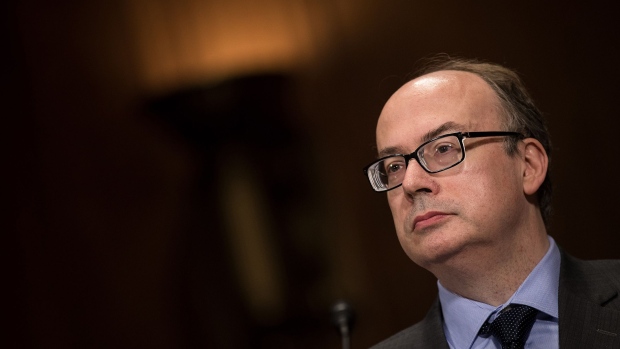Jan 23, 2021
Ex-DOJ Official Called ‘Radioactive’ After Alleged Election Plot
, Bloomberg News

(Bloomberg) -- The Trump administration’s top environmental lawyer faces career repercussions and possibly ethics probes in the wake of allegations, which he disputes, that he worked with President Donald Trump to try to cast doubt on the 2020 election results.
Jeffrey Bossert Clark led the Justice Department’s Environment and Natural Resources Division for two years and served as acting head of the Civil Division during his last four months on the job. The New York Times reported Friday that Clark was involved in a plan to “oust” acting Attorney General Jeffrey A. Rosen and lend legal support to lawsuits challenging the election results.
Clark resigned from the Justice Department Jan. 14, less than a week before the end of Trump’s presidency, and didn’t have a new job lined up at the time. One legal industry consultant said he’d be “radioactive” on the job market now.
Clark acknowledged meeting with Trump but said he didn’t devise a plan to oust Rosen, or “formulate recommendations for action based on factual inaccuracies.”
“There was a candid discussion of options and pros and cons with the President,” he told Bloomberg Law on Friday, adding that legal privileges prevented him from “divulging specifics regarding the conversation.” He didn’t respond to a request to talk about how the allegations might affect his career.
Clark’s former law firm, Kirkland & Ellis LLP, didn’t immediately respond to a request for comment Saturday on whether it’s considering rehiring him.
‘You Don’t Go Back’
Law firms are increasingly aware of reputation hits they could suffer from being connected with someone like Clark, said Kent Zimmermann, a legal industry consultant for the Zeughauser Group. The anti-Trump Lincoln Project, for example, has publicly targeted lawyers who challenged the presidential election results.
“I think most firms are committed to upholding the rule of law and feel strongly about that, and I think that Jeff Clark would be radioactive in their minds and inconsistent with their values,” he said. If a big firm was considering hiring Clark, “I would let the investigation play out and let the chips fall where they may, and then decide after that.”
Jan Jacobowitz, a legal ethics consultant, said firms would have to make a “business decision” that accounts for potential disruption or harm to their practice.
UCLA legal ethics professor Scott L. Cummings said a lawyer facing such accusations would most likely land in a small firm or organization that’s “part of the Trump faction of the conservative movement.”
“You don’t go back into mainstream Big Law practice after engaging in this kind of incendiary conduct,” he said, referring to the allegations in the New York Times report.
‘Mobilized’ on Ethics
In addition to potential federal probes into Clark’s alleged actions, legal ethics experts say could face disciplinary proceedings and possible sanctions.
Lawyers are charged with upholding the rule of law and prohibited from advising clients to engage in illegal activity, Jacobowitz, the consultant, said, though “the analysis of the distinction between valid legal advice and crossing the line is sometimes a tortured one.”
Unlikely Discipline
Clark is licensed to practice law by the District of Columbia Bar. The group is unlikely to take disciplinary action based on the actions reported by the New York Times, said Mason E. Lowe, a professor at William & Mary Law School.
“It’s possible, of course, that a DOJ investigation could shed more light, but lawyers are permitted to discuss various options with clients, even the consequences of illegal conduct, so long as they lawyer doesn’t counsel the client to engage in illegal conduct,” he said.
Cummings said the bar would probably also take into account the fact that the alleged effort to sideline Rosen didn’t come to pass.
Bar disciplinary proceedings can stretch for months or even years, and can lead to sanctions ranging from a private reprimand to disbarment.
Reaction in Environment World
Friday’s report set off shock waves in environmental law circles. Clark’s former colleagues and legal adversaries expressed surprise and disgust in public posts and private messages. Environmental advocates who have long disliked Clark for his aggressively conservative legal positions seized on the news.
“It’s sort of nice that the whole world finally gets to see the insanity we’ve been fighting for the last four years,” Earthjustice vice president Sam Sankar said.
As the head of the Justice Department’s environment division, Clark led the defense of the Trump administration’s deregulation agenda. He also made waves with aggressive litigation moves and a series of last-minute memos before he stepped down.
In an interview five days after pro-Trump protesters stormed the U.S. Capitol, Clark said serving as acting head of the Civil Division since September was “a very interesting challenge.”
“I don’t think that any of my service in the environment division has any connection to the events of last week, and I would just reiterate to you that they’re tragic events,” Clark said. “Any form of violence, I condemn.”
©2021 Bloomberg L.P.






